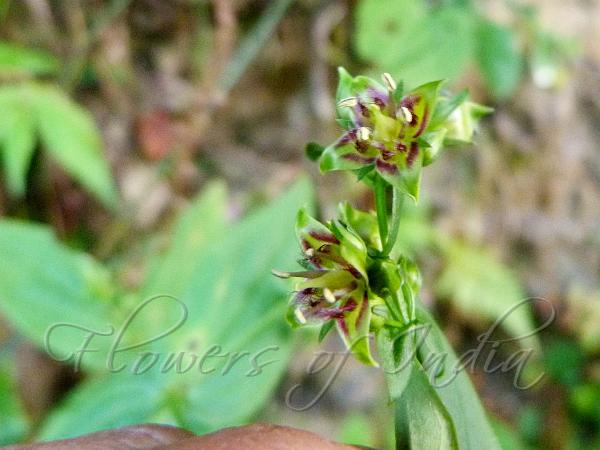|
| Chirayita |
|

|

| File size | 718208 |
| Original date | 10/24/12 5:27 PM |
| Resolution | 2560 x 1920 |
| Flash | Flash did not fire, auto |
| Focal length | 4.5mm |
| Exposure time | 1/13s |
| Aperture | 2.8 |
| Focus Distance | |
| Metering Mode | Multi-segment |
| Camera make | Panasonic |
| Camera model | DMC-FZ40 |
| Sensor type | OneChipColorArea |
|
|
|
|
Photo: |
Botanical name: Swertia chirayita Family: Gentianaceae (Gentian family)
Synonyms: Swertia chirata, Ophelia chirata
Synonyms: Swertia chirata, Ophelia chirata
Chirayita is a medicinal plant indigenous to temperate Himalaya. Chirayita
has an erect, about 2–3 ft long stem, the middle portion is round, while
the upper is four-angled, with a prominent decurrent line at each angle.
The stems are orange brown or purplish in colour. Leaves are opposite-
arranged in mutually perpendicular pairs, broadly ovate or lanceshaped,
3.5-10 x 1.5-4 cm, hairless, blunt or heart-shaped at base, tapering at tip,
margins entire, usually with 3-7 prominent lateral veins.
Flowering in Chirayita is in the form of numerous small, axillary,
opposite, lax cymes arranged as short branches and the whole inflorescence
is 2 ft long. Flowers are small, stalked, green-yellow, tinged with purple
colour. The flower-tube is twice as long as the sepal-cup and has
4 ovate-lanceshaped petals. The upper surface of the petal
has a pair of nectaries covered with oblong scales and ending as fringes.
There are 4 sepals, much narrower and smaller than the petals.
The plant is found in the Himalayas at altitudes of 1200-3000 m, from
Kashmir to Bhutan, and NE India. It can be grown in sub-temperate
regions between 1500 and 2100 m altitudes.
Medicinal uses: Its medicinal usage is reported in Indian pharmaceutical codex, the British and the American pharmacopoeias and in different traditional systems of medicines such as the Ayurveda, Unani and Siddha.
Medicinal uses: Its medicinal usage is reported in Indian pharmaceutical codex, the British and the American pharmacopoeias and in different traditional systems of medicines such as the Ayurveda, Unani and Siddha.
| Identification credit: Gurcharan Singh | Photographed in Dhanaulti, Uttarakhand. |
• Is this flower misidentified? If yes,